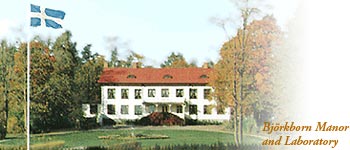Alfred Nobel (1833-1896) was born in Stockholm, Sweden, on 21 October 1833. His family was descended from Olof Rudbeck, the best-known technical genius in Sweden in the 17th century, an era in which Sweden was a great power in northern Europe. Nobel was fluent in several languages, and wrote poetry and drama. Nobel was also very interested in social and peace-related issues, and held views that were considered radical during his time. Alfred Nobel’s interests are reflected in the prize he established. Learn more about his life and his interests – science, inventions, entrepreneurship, literature and peace work.
Alfred Nobel’s life and work
Alfred Nobel’s life and work – for gradeschoolers
Alfred Nobel – his life and work
By Nils Ringertz
Alfred Nobel – St. Petersburg, 1842-1863
By Birgitta Lemmel
Alfred Nobel’s health and his interest in medicine
By Nils Ringertz
Alfred Nobel and his interest in literature
Alfred Nobel’s collection of books bears testimony to both the depth and breadth of his reading
By Åke Erlandsson
The private library of Alfred Nobel
Alfred Nobel – the poet
Alfred Nobel’s collection of books bears testimony to both the depth and breadth of his reading
By Åke Erlandsson
Alfred Nobel – life and philosophy
By Tore Frängsmyr
Alfred Nobel’s thoughts on war and peace
By Sven Tägil
Alfred Nobel’s house in Paris
By Birgitta Lemmel
Alfred Nobel’s final years in San Remo
Alfred Nobel died in his villa overlooking the Mediterranean in Sanremo, Italy
By Lorenette Gozzo
Alfred Nobel’s industrial activities
Alfred Nobel’s industrial activities in Vinterviken
By Birgitta Lemmel
Alfred Nobel in Krümmel
Alfred Nobel established his first overseas company in Krümmel, Germany
By Birgitta Lemmel
Alfred Nobel in Scotland
By John E. Dolan
By Birgitta Lemmel
Alfred Nobel’s dynamite companies
By Ragnhild Lundström
List of Alfred Nobel’s patents
Alfred Nobel’s home in Björkborn
Towards the end of his life, Alfred Nobel acquired the company “AB Bofors” in Karlskoga, Sweden. At Björkborn, a property on the Bofors estate, Björkborn Manor became his last home in Sweden.
Björkborn Manor is now a museum where visitors can go back in time and imagine what it was like when Alfred Nobel spent his summers here. Apart from the manor, another point of interest is the laboratory where Nobel continued with his experiments before his death in 1896.

Read more about Björkborn Manor at the web site of the Nobel Museum in Karlskoga, Sweden
Aphorisms by Alfred Nobel
Literature occupied a central role in the life of Alfred Nobel. He regarded various literary forms of expression as opportunities to achieve a greater understanding of our own thoughts, lives and relationships with other people and our surroundings. Alfred Nobel had an extensive library, which included important European literary works. Inspired by Shelley and Byron, he wrote poems in English as a young man. Toward the end of his life, he wrote the tragedy Nemesis. His best literary form of expression was probably the aphorism, where he often expressed himself drastically.
“A heart can no more be forced to love than a stomach can be forced to digest food by persuasion.”
“Second to agriculture, humbug is the biggest industry of our age.”
“Contentment is the only real wealth.”
“We build upon the sand, and the older we become, the more unstable this foundation becomes.”
“The truthful man is usually a liar.”
“Justice is to be found only in the imagination.”
“It is not sufficient to be worthy of respect in order to be respected.”
“Worry is the stomach’s worst poison.”
“The best excuse for the fallen ones is that Madame Justice herself is one of them.”
“Self-respect without the respect of others is like a jewel which will not stand the daylight.”
“Hope is nature’s veil for hiding truth’s nakedness.”
“Lying is the greatest of all sins.”
“Home is where I work and I work everywhere.”